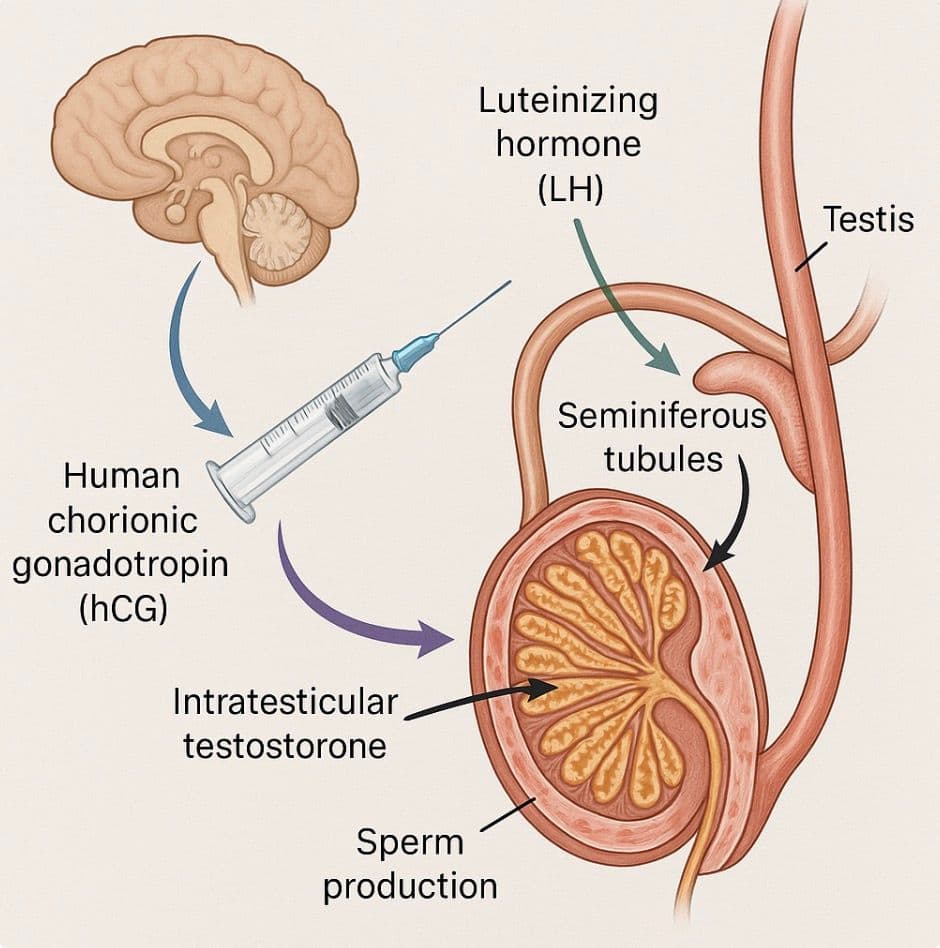How Quickly Does hCG Increase Sperm Count?
Published on:
Updated on:

People are asking...
How far in advance should one start HCG before trying to conceive?...
Generally 3-6 month's heads up is what we suggest, 3 months is the minimum time it takes for a sperm to reach maturity.... See Full Answer
Would hCG increase sperm motility in an asthenozoospermia situation.?...
hCG has been shown to help with sperm motility, though only slightly. hCG is far better for sperm count than for motility. FSH is more important for motility parameters.... See Full Answer
After being on TRT for a while, is there any way to increase the sperm count in case you want to have a child? Number one reason I haven't started TRT...
Taking hCG concurrently while on TRT can maintain sperm production.... See Full Answer
Have a question? Ask us.
At AlphaMD, we're here to help. Feel free to ask us any question you would like about TRT, medical weightloss, ED, or other topics related to men's health. Or take a moment to browse through our past questions.
Human chorionic gonadotropin (hCG) is commonly used in men’s health to treat low testosterone, but it also plays a key role in male fertility—specifically by helping increase sperm production. For men looking to restore fertility while on testosterone replacement therapy (TRT) or those with hormonal imbalances like hypogonadotropic hypogonadism, hCG can be a vital part of the treatment plan.
How hCG Works to Stimulate Sperm Production
In men, hCG mimics the action of luteinizing hormone (LH), stimulating the Leydig cells in the testes to produce testosterone. This localized testosterone production is essential for the development of sperm (a process called spermatogenesis). Without sufficient intratesticular testosterone, sperm production declines—even if overall testosterone levels in the blood are normal due to external TRT.By maintaining or boosting testosterone within the testes, hCG helps restart or support natural sperm production.
When Can You Expect Results?
The timeline for improved sperm counts with hCG varies by individual and depends on several factors, including:
- Baseline testicular volume
- Severity of hormone deficiency
- Age and overall health
- Whether hCG is used alone or combined with other fertility medications like FSH or hMG
Short-Term Improvements
Some men begin to see sperm return to their ejaculate after about 3 months of consistent hCG use. This is especially true for those who still have some baseline sperm production or are transitioning off TRT.
Longer-Term Outcomes
For others, particularly those with more severe hormonal imbalances or long-term suppression of natural production, it may take 6–12 months or longer for sperm counts to rise to levels suitable for fertility. In one clinical study, researchers found that men with hypogonadotropic hypogonadism treated with hCG showed significant increases in sperm concentration and count after just three months of therapy (source).
Final Thoughts
While hCG doesn’t work overnight, it is an evidence-backed and effective tool for stimulating sperm production in men with low testosterone or suppressed fertility. As with any hormone therapy, the key to success is consistency, follow-up testing, and support from a knowledgeable healthcare provider.At AlphaMD, we specialize in online, patient-centered care—including testosterone replacement and fertility support. Through virtual consultations and convenient at-home delivery, we’re here to help patients—male and female—access high-quality care with expert guidance every step of the way.
Have a question? Ask us.
At AlphaMD, we're here to help. Feel free to ask us any question you would like about TRT, medical weightloss, ED, or other topics related to men's health. Or take a moment to browse through our past questions.
People are asking...
How far in advance should one start HCG before trying to conceive?...
Generally 3-6 month's heads up is what we suggest, 3 months is the minimum time it takes for a sperm to reach maturity.... See Full Answer
Would hCG increase sperm motility in an asthenozoospermia situation.?...
hCG has been shown to help with sperm motility, though only slightly. hCG is far better for sperm count than for motility. FSH is more important for motility parameters.... See Full Answer
After being on TRT for a while, is there any way to increase the sperm count in case you want to have a child? Number one reason I haven't started TRT...
Taking hCG concurrently while on TRT can maintain sperm production.... See Full Answer
Get $30 off your first month’s order
Enter your email address now to receive $30 off your first month’s cost, other discounts, and additional information about TRT.
Legal Disclaimer
This website is a repository of publicly available information and is not intended to form a physician-patient relationship with any individual. The content of this website is for informational purposes only. The information presented on this website is not intended to take the place of your personal physician's advice and is not intended to diagnose, treat, cure, or prevent any disease. Discuss this information with your own physician or healthcare provider to determine what is right for you. All information is intended for your general knowledge only and is not a substitute for medical advice or treatment for specific medical conditions. The information contained herein is presented in summary form only and intended to provide broad consumer understanding and knowledge. The information should not be considered complete and should not be used in place of a visit, phone or telemedicine call, consultation or advice of your physician or other healthcare provider. Only a qualified physician in your state can determine if you qualify for and should undertake treatment.
